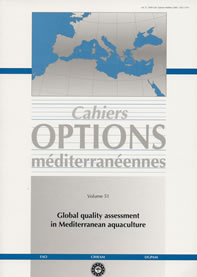| Article précédent | p. 23-30 | Article suivant |
Introduction to the analysis of regulations and texts of interest to safety of fish products from aquaculture
One of the key factors of aquaculture development is quality, and within the concept of quality, safety is the first necessary condition to fulfil. Consumers are increasingly interested in safety and quality aspects and the EU and USA, for instance, put new safety regulations in force. New regulations have introduced the Hazard Analysis and Critical Control Point (HACCP) system, which is basically the control of food safety during food production and processing. There is a notorious change of paradigm regarding the previous system based on control through the analysis of samples of the final product. HACCP-based regulations regarding the safety of fish products apply to fish and fish products from aquaculture. However, aquaculture fish presents particular characteristics that are taken into account in safety regulations like residues of veterinary drugs. At the same time, aquaculture in itself is regulated as an economic activity, and this set of regulations is centred on the health of the cultured fish. Both visions should not necessarily be in contradiction. In the coming years we may expect an evolution of regulations, in order to have a more consolidated view of aquaculture production and to accommodate the introduction of new concepts like those derived from risk assessment, and codes of practice of responsible aquaculture and good animal feeding. This paper briefly reviews the current status of food safety regulations as they apply to aquaculture fish, according to EU and USA regulations, and discusses the structure of national regulations and international documents that apply to fish safety.
- [ Afficher ]
- [ Télécharger ]
- [ Exporter la citation ]
Vous pouvez télécharger la citation au format :
- [ Imprimer ]
-
Mots-clés
INNOCUITE DES PRODUITS ALIMENTAIRES, PRODUIT A BASE DE POISSON, REGLEMENTATIONCiter cet article
Lupin H.M. Introduction to the analysis of regulations and texts of interest to safety of fish products from aquaculture. Global quality assessment in Mediterranean aquaculture. Zaragoza : CIHEAM, 2000. p. 23-30. (Cahiers Options Méditerranéennes; n. 51). Workshop of the CIHEAM Networks on Technology of Aquaculture in the Mediterranean (TECAM) and Socio-Economic and Legal aspects of Aquaculture in the Mediterranean, 1999/11/29-1999/12/01, Barcelona (Spain). http://om.ciheam.org/om/pdf/c51/00600285.pdf



